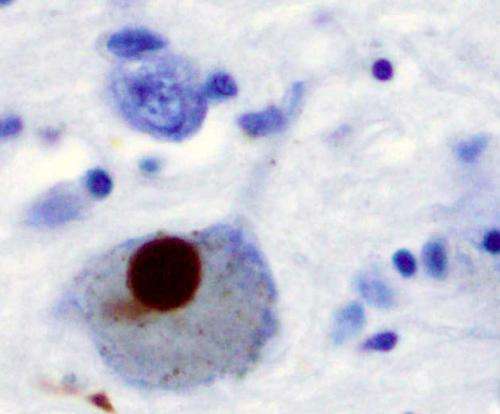Big data, bench science suggests drug may slow Parkinson's progression in people

A drug used to treat enlarged prostate may also be able to slow the progression of Parkinson's disease.
The surprising finding, published Sept. 16 online in the Journal of Clinical Investigation, is the result of an international collaboration involving researchers in China and at the University of Iowa that combines basic molecular biology with big data.
"Current medicines can partially alleviate some of the symptoms of Parkinson's disease. But today we have zero treatments that change the progressive course of this neurodegenerative disease. That's a terrible state, because as our population ages Parkinson's disease is going to become increasingly common," says senior study author Michael Welsh, MD, UI professor of internal medicine, a Howard Hughes Medical Institute investigator, and director of the Pappajohn Biomedical Institute at the UI. "I'm really excited about this finding because I think it has the opportunity to change the lives of people with Parkinson's disease (and possibly other types of neurodegenerative disease.)"
The research grew from the discovery by co-senior study author Lei Liu, Ph.D., at Capital Medical University in Beijing, China, that terazosin, a drug for treating enlarged prostate, or benign prostatic hyperplasia, could also block cell death. Liu's team discovered that the cell-protective activity was due to terazosin's ability to activate an enzyme called PGK1, which is critical for cellular energy production.
That discovery brought Parkinson's disease (PD) into the picture. Reduced cellular energy production is a hallmark of PD, and energy production declines with aging, which is a primary risk factor for PD. In addition, several inherited forms of PD are caused by genetic defects in cellular energy pathways, and PD-causing drugs damage energy production in neurons.
The convergence of these lines of research suggested that terazosin's ability to boost energy production in cells might help alleviate cell death in PD. To test the idea, the researchers treated various experimental models of PD with terazosin. They found that terazosin could prevent neurodegeneration if it was given before the onset of cell death. Moreover, the drug could slow or stop neurodegeneration, even if treatment was delayed until after neurodegeneration had started to develop.
"When we tested the drug in various different animal models of PD, they all got better. Both the molecular changes in the brain associated with cell death and the motor coordination in the animals improved," says Liu, a professor in the Beijing Institute for Brain Disorders, who received his doctoral degree in 2002 from the UI working with Welsh.
However, encouraging results in animals do not necessarily predict similar outcomes in people. So, Welsh turned to Nandakumar Narayanan, MD, Ph.D., a UI neurologist who cares for patients with PD and studies the disease in people. The researchers quickly realized that one group of people who tend to get PD—older men—are the same people who are likely taking terazosin for enlarged prostate, meaning that existing clinical databases might reveal whether terazosin has any effect on PD in people.
Narayanan and Jordan Schultz, PharmD, UI assistant professor of psychiatry, examined the Parkinson's Progression Markers Initiative (PPMI) database, which is sponsored by The Michael J. Fox Foundation for Parkinson's Research. The data showed that men with PD who were taking terazosin had reduced rates of progressive motor disability compared to men with PD who were taking a different drug, tamsulosin, for enlarged prostate. Tamsulosin serves as a good control because it is also used to treat benign prostatic hyperplasia, but unlike terazosin, it does not have any effect on the PGK1 enzyme.
The result seemed promising, but the PPMI is a small database. Only 13 men were identified who were taking terazosin or one of two similar drugs that also activate the PGK1 enzyme, compared to 293 men with PD who were either taking tamsulosin or were not taking any of these drugs. While the differences in motor decline between the two groups were statistically significant, the team looked to confirm the findings using a much larger dataset—the IBM Watson/Truven Health Analytics MarketScan Database, which includes de-identified records of more than 250 million people.
In collaboration with Jacob Simmering, Ph.D., UI assistant professor of internal medicine, and Philip Polgreen, MD, UI professor of internal medicine and epidemiology, who had access to the MarketScan Database, the team identified 2880 Parkinson's patients taking one of the three drugs that target PGK1 and a comparison group of 15,409 PD patients taking tamsulosin. Using ICD-9/ICD-10 medical codes to track PD-related diagnoses and hospital or clinic visits for all the patients, the data suggested that under real world conditions, terazosin and related drugs reduce the signs, symptoms, and complications of Parkinson's disease.
"What is particularly exciting is that terazosin is a 'repurposed drug'. So, we have a lot of safety data already from its clinical use to treat enlarged prostate," Narayanan says. "We are currently engaged in planning phase 1 studies that are funded and we are recruiting patients in Iowa. This is the beginning of what we hope is a sustained and rigorous effort to test this molecule prospectively in order to really determine whether this works.
"I don't know of many stories like this that have basic science produce rigorous and convergent lines of evidence that also have clinical evidence in them," adds Narayanan, who is a member of the Pappajohn Biomedical Institute (PBI) and the Iowa Neuroscience Institute at the UI. "These results grew out of the unique collaborative environment we have here at the University of Iowa and specifically in the PBI, and was really facilitated by our ability and willingness to interact across disciplines."
More information: Rong Cai et al, Enhancing glycolysis attenuates Parkinson's disease progression in models and clinical databases, Journal of Clinical Investigation (2019). DOI: 10.1172/JCI129987





















